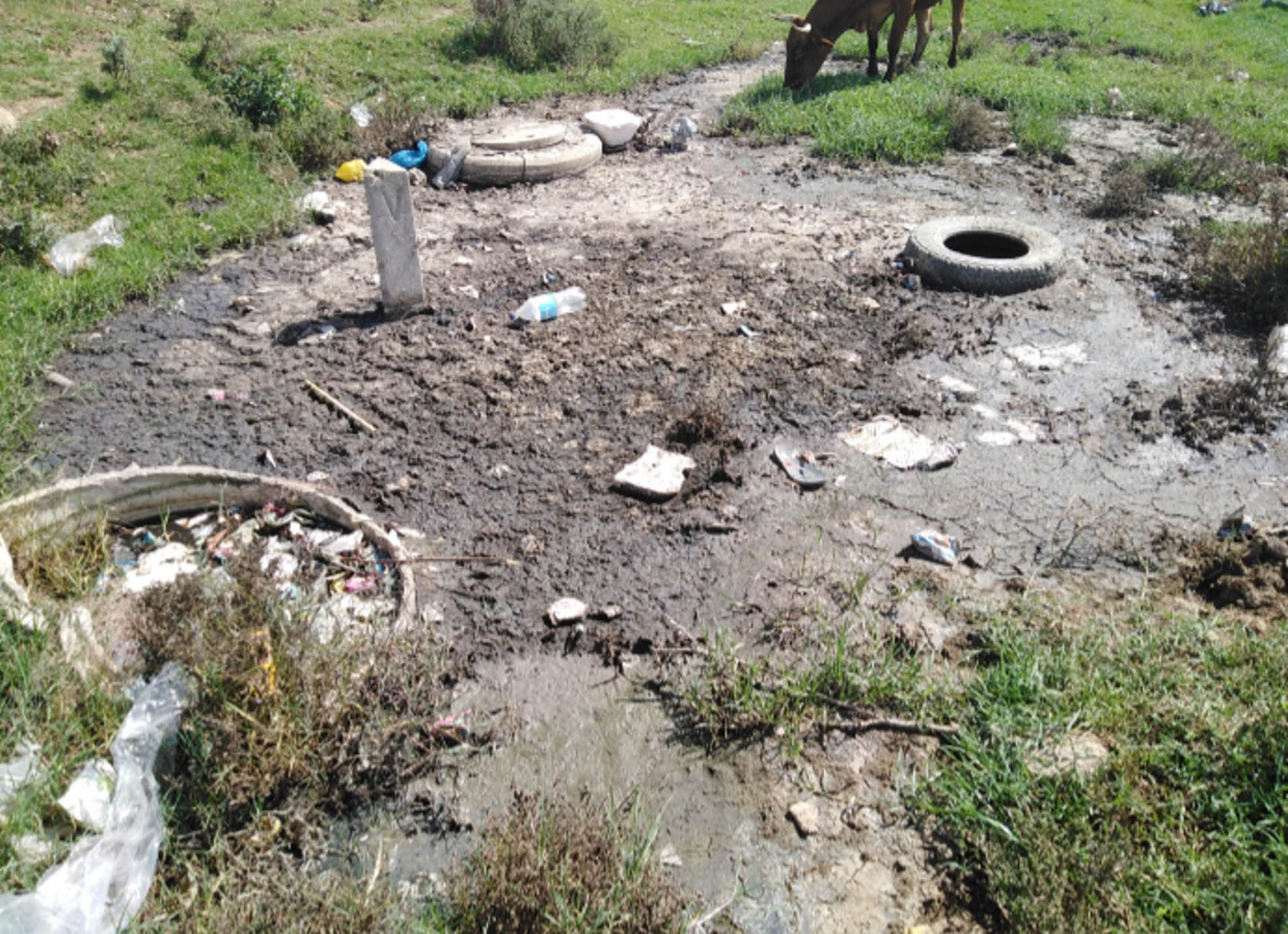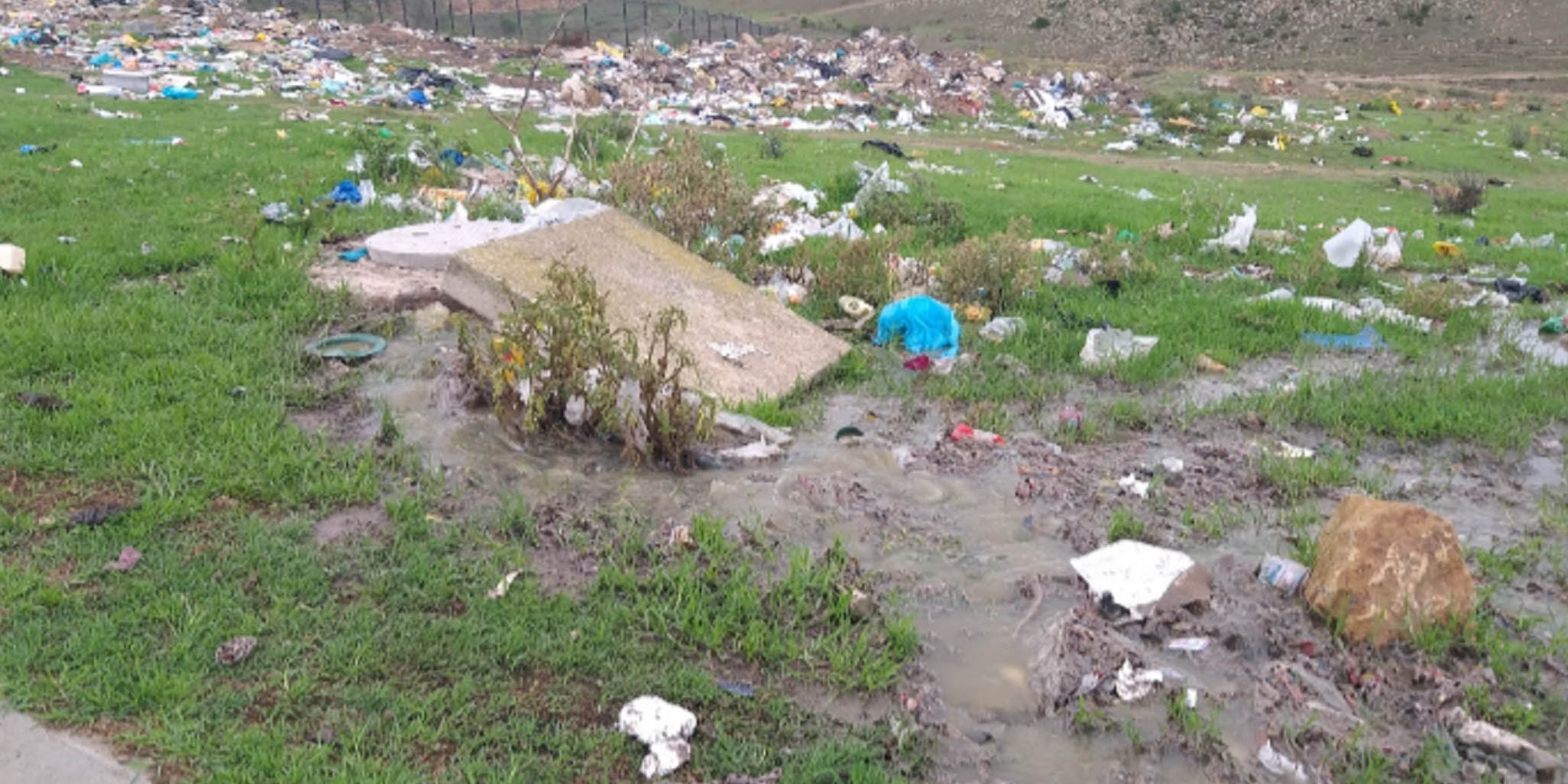
One of several images attached to court papers to show the extent of sewage spills around Makhanda. (Photo: Cecile van Schalkwyk)
Hundreds of pages of court papers are filled with disturbing accounts of how the collapsing sewage systems, run by the Makana municipality, are putting residents, rivers, animals and the environment at extreme risk.
Many times over, residents would state in sworn affidavits that they simply cannot get any answers from the municipality. Horrific accounts of sewage spills – some so bad that people have to flee their homes or have to cross large pools of raw sewage, nappies, toilet paper and tampons fill the court files – are compounded by disturbing reports from national government that the sewerage plants in Makhanda are operating illegally as they are simply too broken.
“Residents are being held hostage by this situation over which they have little control. Makana Municipality has known for in excess of eight years that the sewerage works are insufficient for the needs of its residents, yet have failed or refused to attend to the issue at hand. Interventions have been incremental and have by no means addressed the underlying systemic problems that cause the spills in the first place,” it is stated in papers before court.
The case was filed by the Legal Resources Centre on behalf of the town’s residents.
In a recent judgment in the same court the Eastern Cape provincial government was ordered to dissolve the Makana municipality, with Judge Igna Stretch saying that their extensive failure to provide services, including proper sewage management and refuse removal, was unconstitutional. The provincial government and the municipality have applied for leave to appeal this judgment.
The municipality also indicated that it will oppose the latest legal action against it. It claimed in a statement issued at the end of January 2020 that there were serious problems in the town’s sewerage networks and that it will need close to R400-million to fix it.
One of the applicants in the sewage case, Vusi Mthombeni, is a freshwater ecologist and a property owner in Makhanda. All of the applicants, he explained, have homes close to municipal drains.
“The drains are constantly overflowing with raw sewerage that spills into [our] homes or collects outside … This causes an environmental and health risk as it exposes [both] the applicants and the broader community to raw and untreated sewage that could cause serious health problems. In addition, the applicants’ use and enjoyment of their properties are continuously infringed as the smell of the sewage and the overflow into their homes makes the occupation of their homes unpleasant and at times impossible,” he said.
He added that the sewage problem in town is affecting the entire Makhanda community.
“There are numerous overflowing drains and burst or broken pipes that cause sewage spills in the streets, gardens, on communal land, business properties and schools.”

One of several images attached to court papers to show the extent of sewage spills around Makhanda. (Photo: Cecile van Schalkwyk)
According to a service delivery app used to monitor sewage spills in Makhanda, there were 107 cases reported to the municipality between January 2019 and 15 July 2019.
“Residents who do not reside next to the sewage spill are regularly exposed to the raw sewage when driving or walking through the town. This is a widespread problem that affects each and every resident in Makhanda and impacts severely on their quality of life,” Mthombeni said.
Residents waiting for low-cost housing are no longer able to access homes as the absence of a properly functioning sewerage system has also halted further housing developments in Makhanda, according to papers before the court. One of these developments is now seven years overdue.
“The municipality has known about the problems with the sewerage systems since at least 2010, but has failed to adequately address them and find long-term solutions for the problem. Instead, the municipality has either wilfully or negligently ignored the plight of the applicants and the community of Makhanda. This has resulted in a health and environmental crisis that can no longer be ignored,” Mthombeni added.
According to reports that form part of papers before court the municipality was warned by structural engineers in 2011 that the Belmont Treatment Works was functioning at 48% above its design capacity in times of normal rainfall and 74% on days with high rainfall. Parts of the treatment works are close to 90 years old and have been described as being in “a serious state of disrepair”.
“Certain sections of the walls are collapsing and are being supported with trusses,” the report stated.
Court papers also contain documentation from the national Department of Water and Sanitation warning the municipality of the risk posed to water resources by the malfunctioning treatment works. The department had threatened to take the municipality to court to ensure compliance but nothing has come of it and in March 2019 warned the municipality that it was operating the treatment works illegally.

One of several images attached to court papers to show the extent of sewage spills around Makhanda. (Photo: Cecile van Schalkwyk)
Mthombeni added that the municipality’s consistent failure to take action “has had devastating consequences” for residents who now have to live with “the disastrous effects of an over capacitated sanitation system which has fallen into complete disrepair”. He added that due to the municipality not consistently collecting rubbish, many of the spills are caused by foreign objects lodged in sewage pipes and broken pipes.
According to court papers there also haven’t been any awareness campaigns to educate residents on the type of rubbish that cannot be disposed of through the toilets.
“This awareness campaign has to focus specifically on the dangers of disposing of diapers that flow into the existing sewerage lines and cause blockages. If these diapers were collected and taken to the rubbish dump in town, it would improve the overflow of sewerage,” Mthombeni added.
A structural engineer, Henty van der Merwe, was asked to compile a report for the court detailing the extent of the problem in Makhanda. He stated that 90% of the system is made of clay and has not been replaced by PVC piping. He added that the system needed bigger pipes.
Mthombeni said he bought a house as an investment in De Villiers Close, Makhanda in 2005.
“The property is situated in a popular area and I have no problem sourcing tenants to occupy the house. The difficulty is retaining the tenants because of the regular flow of raw sewage from a municipal manhole in front of the property that floods the house every time there is moderate to heavy rainfall.
“There is a sewerage drain located in front of the gate to my premises … When it rains, raw sewage is pushed up through the drain cover. From the manhole the sewage flows directly into my yard and floods the garden and the house. The sewage also routinely runs into the nearby river that flows at the back of my home. This is not a small trickle of water or a minor sewerage leak, but a flood throughout my entire garden and home. The sewage also contains used toilet paper, tampons and sanitary towels. On a close inspection of the waste, human faeces is discernible,” he added.
“The smell of the sewage is unbearable. It is not viable for anyone to live in these conditions. I am unable to sell the property as nobody wants to buy it. My greatest concern is the health risk that the raw sewage poses. The sewage is untreated and contains human faeces. There are often young children playing in the street in front of my house or walking past the manhole. These children are exposed to the raw sewage and are particularly vulnerable to disease. The sewage runs into the natural stormwater river at the back of my home. People and animals are exposed to the water in the river, causing further environmental pollution,” he said.
He added that he had been trying since 2015 to have the problem solved but nothing has happened yet.
“While there have been many inspections of my property and many suggested interventions, they have all come to nothing.”
Thys Smit, a pensioner living Grave Street, explained in an affidavit that there was a main sewerage pipe that ran below the street in front of his home. Blockages in this pipe are causing raw sewage to pool about 25 metres from his gate.
“A large area becomes submerged, making it impossible to cross the railway line without walking through raw sewage,” his affidavit states. He further explained that the sewage has an appalling smell and often makes him gag.
Desperate residents from Joza location have formed a committee to try to deal with the municipality over sewage issues – but to no avail. Cingiswa Pamela Sandi explained in an affidavit that the sewage problems started in 2016 but have become progressively worse since 2018 when the municipality installed more toilets in the area. Sewage runs underneath many residents’ houses.
“The stench in this area is appalling,” one of the affidavits read. One of the women who lives in the area, Sindiswa Lukwe, often has raw faeces spilling into her bedroom.
Papers before court further detail that residents are struggling with skin and eye infections.
“It is also clear that there is a serious lack of capacity on the part of the municipality to deal with the problem. There is no short- or long-term plan to address the dysfunctional sewerage works, and very little communication with the affected communities. Municipal equipment utilised to address the problem on a short-term basis is often broken. Municipal officials frequently make promises to visit sites, meet with the residents, or send technicians to inspect their sites, yet for unexplained reasons no one arrives and there is no follow up,” Mthombeni said.
“There have been many broken promises to come and fix the sewage spills, without any tangible results. There is no reason to believe that the municipality and [other government departments] will do anything without the intervention of the courts. We cannot fix the municipal sewerage system ourselves and we do not have the resources or the skills to fix the structural issue that causes the sewage to overflow,” Mthombeni added.
No date has yet been set for the case to be heard. MC




















 Become an Insider
Become an Insider